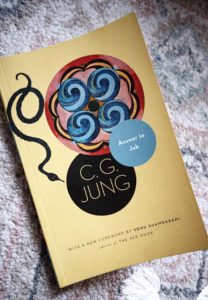
Everything now depends on man: immense power of destruction is given into his hand, and the question is whether he can resist the will to use it, and can temper his will with the spirit of love and wisdom. He will hardly be capable of doing so on his own unaided resources. He needs the help of an “advocate” in heaven, that is, the child who was caught up to God and who brings the “healing” and making whole of the hitherto fragmentary man. Whatever man’s wholeness, or the self, may mean per se, empirically it is an image of the goal of life spontaneously produced by the unconscious, irrespective of the wishes and fears of the conscious mind. It stands for the goal of the total man, for the realization of his wholeness and individuality with or without consent of his will. The dynamic of this process is instinct, which ensures that everything which belongs to an individual’s life shall enter into it, whether he consents or not, or is conscious of what is happening to him or not. Obviously, it makes a great deal of difference subjectively whether he knows what he is living out, whether he understands what he is doing, and whether he accepts responsibility for what he proposes to do or has done. The difference between conscious realization and the lack of it has been roundly formulated in the saying of Christ already quoted: “Man, if indeed thou knows what thou doest, thou art blessed: but if thou knowest not, thou art cursed, and a transgressor of the law.” Before the bar of nature and fate, unconsciousness is never accepted as an excuse; on the contrary, there are very severe penalties for it. Hence all unconscious nature longs for the light of consciousness while frantically struggling against it at the same time.
The conscious realization of what is hidden and kept secret certainly confronts us with an insoluble conflict; at least this is how it appears to the conscious mind. But the symbols that rise up out of the unconscious in dreams show it rather as a confrontation of opposites, and the images of the goal represent their successful reconciliation. Something empirically demonstrable comes to our aid from the depths of our unconscious nature. It is the task of the conscious mind to understand these hints. If this does not happen, the process of individuation will nevertheless continue. The only difference is that we become its victims and are dragged along by the fate towards that inescapable goal which we might have reached walking upright, if only we had taken the trouble and been patient enough to understand in time the meaning of the numina that cross our path. The only thing that really matters now is whether man can climb up to a higher moral level, to a higher plane of consciousness, in order to be equal to the superhuman powers which the fallen angels have played into his hands. But he can make no progress with himself unless he becomes very much better acquainted with his own nature. Unfortunately, a terrifying ignorance prevails in this respect, and an equally great aversion to increasing the knowledge of his intrinsic character. However, in the most unexpected quarters nowadays we find people who can no longer blink the fact that something ought to be done wth man in regard to his psychology. Unfortunately, the little word “ought” tells us that they do not know what to do, and do not know the way that leads to the goal. We can, of course, hope for the undeserved grace of God, who hears our prayers. But God, also does not hear our prayers, wants to become man, and for that purpose he has chosen, through the Holy Ghost, the creaturely man filled with darkness—the natural man who is tainted with original sin and who learnt the divine arts and sciences from the fallen angels. The guilty man is eminently suitable and is therefore chosen to become the vessel for the continuing incarnation, not the guiltless one who holds aloof from the world and refuses to pay his tribute to life, for in him the dark God would find no room.
Since the Apocalypse we now know again that God is not only to be loved, but also to be feared. He fills us with evil as well as good, otherwise he would not need to be feared; and because he wants to become man, the uniting of his antinomy must take place in man. This involves man in a new responsibility. He can no longer wriggle out of it on the plea of his littleness and nothingness, for the dark God has slipped the atom bomb and chemical weapons into his hands and given him the power to empty out the apocalyptic vials of wrath on his fellow creatures. Since he has been granted an almost godlike power, he can no longer remain blind and unconscious. He must know something of God’s nature and of metaphysical processes if he is to understand himself and thereby achieve gnosis of the Divine.
Jung, C.G. Answer to Job. Trans. R. F. C. Hill. Princeton University Press: New Jersey, 1973. 97-98. Print.


